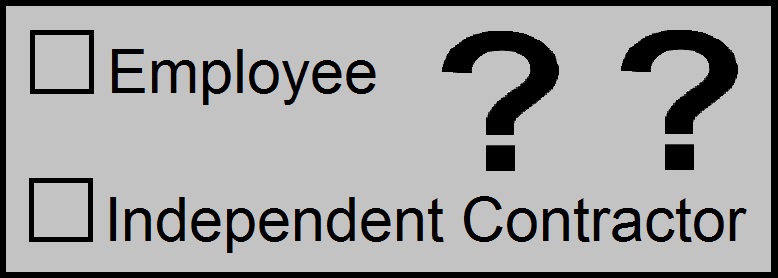Blog

Employee or Independent Contractor – Who is Who in California?
You’re a small business owner, which means you might have some employees. Fantastic. But you also have Steve. Who is Steve? Steve is unique. He works in your business just like the other employees do, but he’s a little different.
If someone were to ask you if Steve is your employee, you’d tell them No. You’d call him an independent contractor, or a subcontractor.
What makes Steve different?
There are lots of reasons. He might be seasonal, showing up during the holidays. He may be a salesperson, paid by commission rather than a salary. He might be someone you’re temporarily using to help with a project, hired on an as-needed basis. Steve may be someone whose work you don’t monitor or control in the same way you do your other employees. Steve may just have more flexibility with his schedule than the other employees do. Whichever scenario applies to you, one thing is the same: you call Steve an independent contractor, or a subcontractor, and give him a 1099 at the end of the year.
Everything is good and clear cut, right? Well….. I hate to be “that guy” but I have to inform you that you might have a problem or two on your hands by classifying Steve as an independent contractor or subcontractor, because he might actually be an employee!
Three questions naturally arise when I make this statement:
- Who says Steve is an employee?
- How do they determine Steve is an employee?
- Why is it a problem?
The answer to the first question is: The State of California and the insurance companies that cover your business.
Both of these entities have great interest in this classification as it has serious effects on how you pay your taxes, which labor laws apply, and how your insurance policy will cover you, and determine your premium. I’m not going to get into that just yet, because it’s for question three, and we’re only on question one.
On to question two: How does the State of California or your insurance company determine whether Steve is an employee or an independent contractor? Answer: through an in-depth multi-factor method. Here’s a table to show you what they look at, with a few tips to make it as clear as possible:
- “Steve” represents any “Person Performing Services, “
- “You” represents any “Alleged Employer” or “Principal.”
- Neither the State of California nor an insurance company looks at any single item to determine whether Steve is an independent contractor or an employee. They look at all of them as a whole and pay close attention to the context of the facts on the ground. Generally speaking, if the majority of questions points to one class, Steve will be put into that one class.
- It’s important to note that you and Steve may think you are in an independent contractor relationship, and you may even have signed a contract stating so, but that doesn’t mean you are! Issuing Steve a 1099 also has no bearing on the nature of the relationship.
If Yes, |
If No, |
||
this indicates Steve is working as an: |
|||
1) |
Is Steve is engaged in an occupation or business distinct from yours? |
Independent Contractor |
Employee |
2) |
Is Steve’s work is a part of your regular business? |
Employee |
Independent Contractor |
3) |
Do you supply Steve’s instrumentalities, tools, & the place for doing the work? |
Employee |
Independent Contractor |
4) |
Do you make an investment in the equipment or materials required for Steve’s tasks? |
Employee |
Independent Contractor |
5) |
Does Steve’s service rendered requires a special skill? |
Independent Contractor |
Employee |
6) |
Is Steve’s work the kind, with reference to the locality, usually done under your direction (as opposed to it being done by a specialist like Steve without your supervision)? |
Employee |
Independent Contractor |
7) |
Does Steve’s opportunity for profit or loss depend on his managerial skill? |
Independent Contractor |
Employee |
8) |
Is the length of time for which Steve’s services to be performed temporary (as opposed to permanent)? |
Independent Contractor |
Employee |
9) |
Is this going to be a permanent working relationship? |
Employee |
Independent Contractor |
10) |
Are you going to pay Steve by the job (as opposed to the hour, or salary)? |
Independent Contractor |
Employee |
You can find more information on California’s Department of Industrial Relations’ website here: www.dir.ca.gov/dlse/faq_independentcontractor.htm.
The next blog post, to be posted next week, will answer question three: why does it matter if Steve is an Independent Contractor or an Employee? You won’t want to miss it!
 ELI GILLESPIE
ELI GILLESPIE
I’m the commercial producer and owner at Gillespie Insurance Services.
SCHEDULE A CALL
SEND EMAIL





